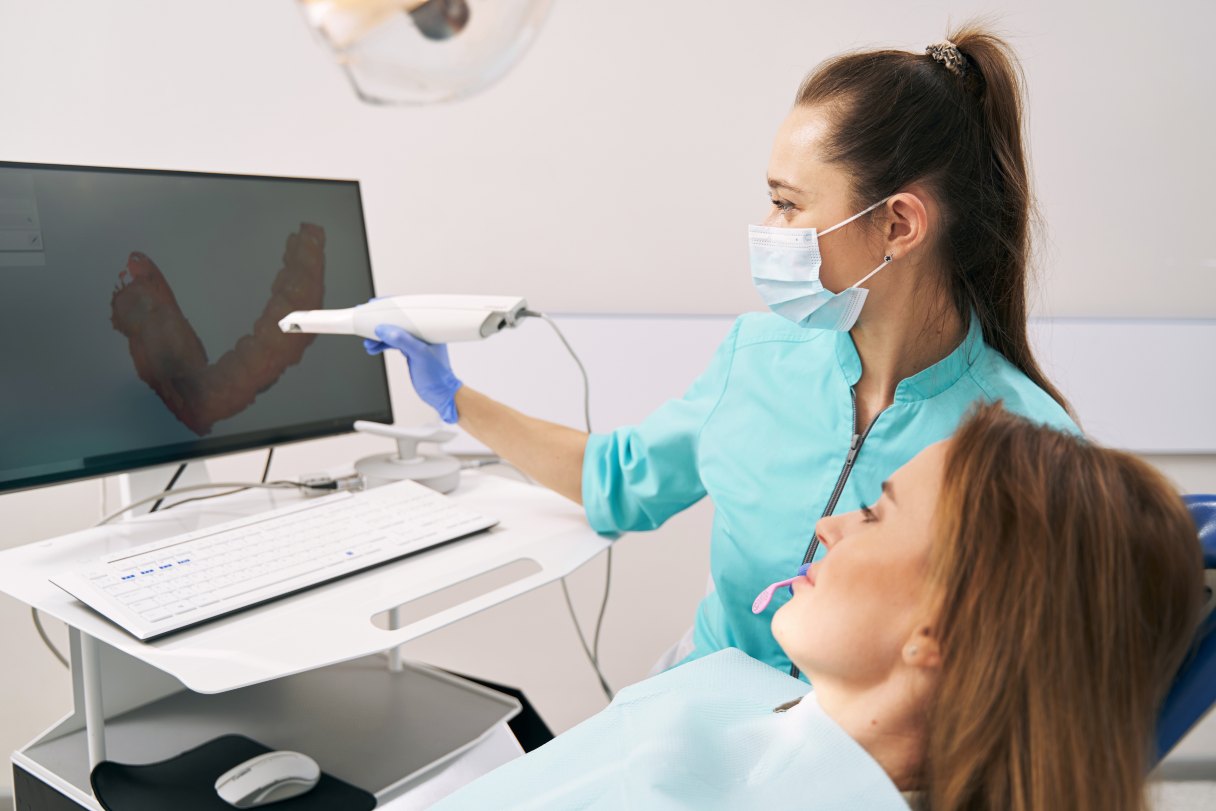Regular dental cleanings are a cornerstone of good oral health and vital to your well-being, yet each year 100 million Americans skip their routine dental exams.1
Dental checkups go beyond simple teeth polishing and involve a comprehensive mouth examination to detect potential issues early on. Read on to learn more about the importance of dental cleanings and what you can expect from your dentist.
Why Dental Cleanings Are Important
Routine dental cleanings are recommended twice a year for most people.1 For kids, their first dental cleaning starts at about 12 months of age or within six months of the appearance of the first tooth.2 Regular dental exams and good oral hygiene practices can prevent most dental diseases.1
Regular dental cleanings are essential for:3
-
Brighter teeth and fresher breath. Cleanings can help brighten your smile by removing stains from coffee, tea, wine, some foods, tobacco and other substances. Cleaning plaque from your teeth also removes the bacteria that live in plaque, which naturally improves your breath.
-
Preventing tooth decay and gum disease. Regular cleanings remove sticky plaque and tartar buildup that can lead to cavities and tooth decay. Removing plaque and tartar also helps prevent gum disease (periodontitis).
-
Early detection. Regular dental checkups can help identify problems or diseases early, when they are easier and more affordable to treat. Preventive dental care is more cost-efficient than the expense that comes with treating advanced dental problems later on.
Types of Dental Cleanings
Depending on your individual needs — as well as the amount of plaque and tartar on your teeth — your dentist will typically perform one of the following cleanings:4
-
Prophylaxis cleaning. Most patients receive this preventive cleaning twice a year to maintain healthy teeth and prevent gum disease or tooth decay. A dentist uses a scaler or a water stream to remove plaque and tartar from the teeth and gumline, followed by cleaning and polishing to remove stains and add shine.
-
Scaling and root planing cleaning. If plaque and tartar accumulate below the gumline, your dentist may recommend scaling and root planing, or deep cleaning. This non-surgical procedure combats the progression of gum disease. Scaling removes plaque and tartar above and below the gumline and from tooth pockets. Root planing smooths the root surfaces to help gum reattachment and eliminate bacteria-harboring pockets. Costs can vary depending on the extent of your procedure.
-
Periodontal maintenance cleaning. This serves as a crucial follow-up to scaling and root planing and is designed to keep periodontal disease in remission. Like scaling and planing, it removes excess tartar and plaque and assesses gum pockets. This cleaning may be performed more frequently than routine cleanings, as gum disease is progressive and can worsen if not effectively treated.
-
Gross debridement cleaning. Severe plaque and tartar buildup that has hardened into calculus over time may require a gross scale or gross debridement cleaning. This cleaning uses an electric tool to remove extensive tartar from the teeth and gumline, which may be causing dental disease.
A gross debridement can take one to four hours to complete. If you experience bleeding, swollen or tender gums, persistent bad breath or loose teeth, consult your dentist.5
It's important to note that more extensive procedures — such as a full mouth debridement that includes scaling and planing — typically are not painful, as your dentist will use a local anesthetic to numb the area. It's common to feel some discomfort or soreness in your gums after the procedure, which usually subsides within a few days.5
How Much Do Dental Cleanings Cost?
The national average cost* for a routine teeth cleaning in the United States is $203 but can range from $50 to $350.6
This cost can vary based on the type of cleaning needed, geographic location and the experience and training of the dentist. Here's a look at the average costs* of a dental cleaning across all 50 states and the District of Columbia.6
Average dental cleaning cost by state/district
| State/District | Average cost |
|---|---|
| Alabama | $223 |
| Alaska | $174 |
| Arizona | $212 |
| Arkansas | $205 |
| California | $206 |
| Colorado | $167 |
| Connecticut | $194 |
| Delaware | $207 |
| District of Columbia | $189 |
| Florida | $210 |
| Georgia | $204 |
| Hawaii | $223 |
| Idaho | $199 |
| Illinois | $181 |
| Indiana | $247 |
| Iowa | $222 |
| Kansas | $226 |
| Kentucky | $168 |
| Louisiana | $221 |
| Maine | $226 |
| Maryland | $201 |
| Massachusetts | $178 |
| Michigan | $218 |
| Minnesota | $194 |
| Mississippi | $194 |
| Missouri | $229 |
| Montana | $236 |
| Nebraska | $210 |
| Nevada | $187 |
| New Hampshire | $153 |
| New Jersey | $194 |
| New Mexico | $225 |
| New York | $209 |
| North Carolina | $198 |
| North Dakota | $263 |
| Ohio | $223 |
| Oklahoma | $227 |
| Oregon | $190 |
| Pennsylvania | $198 |
| Rhode Island | $186 |
| South Carolina | $171 |
| South Dakota | $210 |
| Tennessee | $184 |
| Texas | $227 |
| Utah | $203 |
| Vermont | $183 |
| Virginia | $171 |
| Washington | $166 |
| West Virginia | $191 |
| Wisconsin | $213 |
| Wyoming | $170 |
Does Insurance Cover Dental Cleanings?
Dental cleanings are considered preventive dental care, so up to two cleanings per year are usually fully covered, depending on your policy or plan. Exams and X-rays may be covered as well.7
Check with your plan provider to determine your specific benefits, including any deductible or copay requirements.
What Happens at a Routine Dental Cleaning?
A preventive or prophylaxis dental cleaning usually takes 30 to 60 minutes. A dentist performs an initial examination of your mouth with a mirror to assess any issues or concerns.8
Plaque and tartar are removed from the gumline and between teeth with a scaling tool, and your teeth are then polished with a mild abrasive and high-powered brush.8
The final step of the cleaning is flossing to remove any lingering plaque between teeth and to check for gum bleeding.8
X-rays may be taken before a final checkup with your dentist, who will look for any oral health issues and conduct an oral cancer screening for your tongue, jaw and neck.1 Your dentist will answer any questions you may have and discuss specific recommendations regarding ongoing oral care.8
Regular dental cleanings are a must for maintaining optimal oral health and preventing serious dental issues. From routine checkups to specialized procedures like scaling and root planing, each type of cleaning helps keep your smile healthy and bright. Prevention is key, and regular dental visits are your best defense against dental problems.
Dental Financing With the CareCredit Credit Card
Regular dental checkups are important to help prevent, identify and treat dental problems before they become more advanced. The CareCredit credit card can help you pay for dental exams, cosmetic dental procedures and other costs that insurance doesn’t cover — to help you keep your pearly whites bright and healthy.** Use our Acceptance Locator to find a dentist near you that accepts CareCredit. Make the most of your wellness journey by downloading the CareCredit Mobile App. You can find a provider on the go, manage your CareCredit account and easily access the Well U blog for more great articles, podcasts and videos.
In addition to dental care, you can also use your CareCredit credit card for pet care, cosmetic, vision, hearing, health systems, dermatology, pharmacy purchases, spa treatments and so much more within the CareCredit network. How will you invest in your health and wellness next?
Author Bio
Anne-Marie Kennedy is a freelance writer with more than 20 years of experience covering health and wellness, personal finance and real estate/investing.








